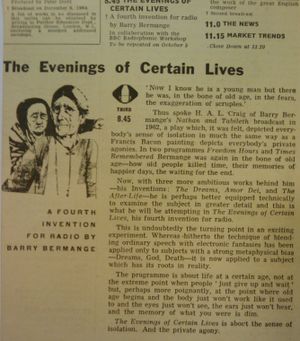Difference between revisions of "DD110010"
Martinwguy (talk | contribs) |
Martinwguy (talk | contribs) |
||
| Line 2: | Line 2: | ||
[[DD110010]] is a clipping from the Radio Times of an article about ''[[The Evenings of Certain Lives]]''. | [[DD110010]] is a clipping from the Radio Times of an article about ''[[The Evenings of Certain Lives]]''. | ||
| + | |||
| + | There is [[:File:clippings2.jpg|a high-definition scan of this]] in the [[Medialink library]]. | ||
<BR CLEAR=ALL> | <BR CLEAR=ALL> | ||
=Transcript= | =Transcript= | ||
Latest revision as of 14:37, 12 June 2021
DD110010 is a clipping from the Radio Times of an article about The Evenings of Certain Lives.
There is a high-definition scan of this in the Medialink library.
Transcript
The Evenings of Certain Lives
Third 8.45
‘Now I know he is a young man but there he was, in the bone of old age, in the fears, the exaggeration of scruples.’
Thus spoke H. A. L. Craig of Barry Bermange's Nathan and Tabileth broadcast in 1962, a play which, it was felt, depicted everybody's sense of isolation in much the same way as a Francis Bacon painting depicts everybody's private agonies. In two programmes Freedom Hours and Times Remembered Bermange was again in the bone of old age--how old people killed time, their memories of happier days, the waiting for the end.
Now, with three more ambitious works behind him--his Inventions: The Dreams, Amor Dei and The After-Life--he is perhaps better equipped technically to examine the subject in greater detail and this is what he will be attempting in The Evenings of Certain Lives, his fourth invention for radio.
This is undoubtedly the turning point in an exciting experiment. Whereas hitherto the technique of blending ordinary speech with electronic fantasies has been applied only to subjects with a strong metaphysical bias--Dreams, God, Death--it is now applied to a subject which has its roots in reality.
The programme is about life at a certain age, not at the extreme point when people ‘just give up and wait’ but, perhaps more poignantly, at the point where old age begins and the body just won't work like it used to and the eyes just won't see, the ears just won't hear, and the memory of what you were is dim.
The Evenings of Certain Lives is about the sense of isolation. And the private agony.
